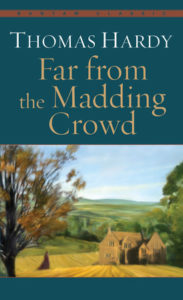Far From the Madding Crowd by Thomas Hardy, I had not realised it is viewed by many as a book of love stories till recently. How blind was I. Fortunately that blindness fooled me with the desire of re-reading it. Strictly speaking, listening to its audio format. Had I classified it into the category of “girly” books earlier, I might not have picked it up again.
Reading Far From the Madding Crowd some years ago for the first time, I was only drawn to this young lady Bathsheba, admiring her charm, independence and fearless pursuit of establishing herself as a very capable Mistress of the farm inherited from her uncle, in a very male-dominated society. I fear I must apologize to farmer Gabriel Oak and William Boldwood for neglecting them previously. As for Sergeant Francis Troy, I loathe him profoundly, hence it was great that I had not given him much attention in my prior reading of this book. A reminder of the century-old wisdom passed on generation by generation: good characters are far more important than dashing appearances.
Thomas Hardy was a poet. Naturally his writings are beautifully poetic. His words are so juicy and tasty. At the tip of his pen there were no ordinary affairs in farm matters or in the ups and downs of human relations. Every little movement, feeling and scene are depicted with the most beautiful lush sentences, as graceful and fresh as the English green. Indeed, the picturesque English countryside filled my imagination while listening to this audiobook. That very same green as in the poem And did those feet in ancient time written by William Blake and later to become the hymn Jerusalem:
And did those feet in ancient time
Walk upon England’s mountains green?
…
I will not cease from Mental Fight,
Nor shall my Sword sleep in my hand:
‘Till we have built Jerusalem,
In England’s green & pleasant Land.
I leave you to enjoy a few pieces by Thomas Hardy from this book.
It is difficult for a woman to define her feelings in language which is chiefly made by men to express theirs.
A resolution to avoid an evil is seldom framed till the evil is so far advanced as to make avoidance impossible.
She was of the stuff of which great men’s mothers are made. She was indispensable to high generation, feared at tea-parties, hated in shops, and loved at crises.
When a strong woman recklessly throws away her strength she is worse than a weak woman who has never any strength to throw away. One source of her inadequacy is the novelty of the occasion. She has never had practice in making the best of such a condition. Weakness is doubly weak by being new.
What a way Oak had, she thought, of enduring things. Boldwood, who seemed so much deeper and higher and stronger in feeling than Gabriel, had not yet learnt, any more than she herself, the simple lesson which Oak showed a mastery of by every turn and look he gave—that among the multitude of interests by which he was surrounded, those which affected his personal well-being were not the most absorbing and important in his eyes. Oak meditatively looked upon the horizon of circumstances without any special regard to his own standpoint in the midst. That was how she would wish to be.
But what between the poor men I won’t have, and the rich men who won’t have me, I stand as a pelican in the wilderness!
What’s right weekdays is right Sundays!
We learn that it is not the rays which bodies absorb, but those which they reject, that give them the colours they are known by; and in the same way people are specialized by their dislikes and antagonisms, whilst their goodwill is looked upon as no attribute at all.
Now mind, you have a mistress instead of a master. I don’t yet know my powers or my talents in farming; but I shall do my best, and if you serve me well, so shall I serve you. Don’t any unfair ones among you (if there are any such, but I hope not) suppose that because I’m a woman I don’t understand the difference between bad goings-on and good.
I shall be up before you are awake; I shall be afield before you are up; and I shall have breakfasted before you are afield. In short, I shall astonish you all.
